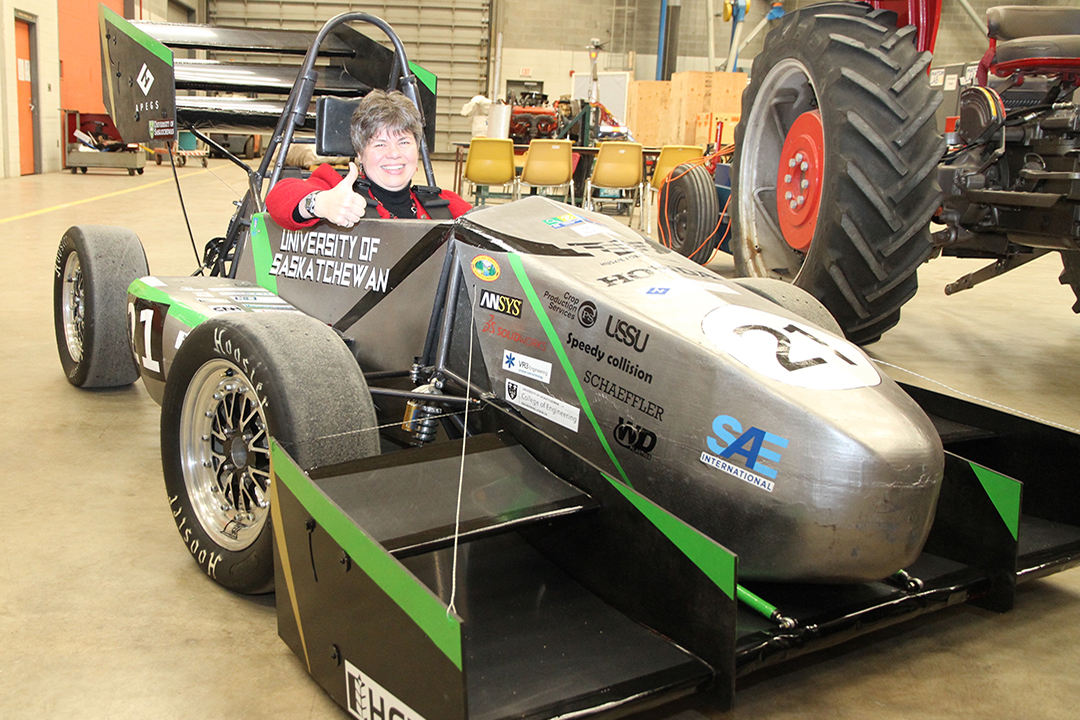
Engineering dean gets right down to business
It comes as no surprise that Suzanne Kresta wasted little time in rolling up her sleeves and getting right to work.
By James ShewagaAfter all, the new dean of the College of Engineering at the University of Saskatchewan has always been just as comfortable out on the job site as she has been in the classroom. In her field, she gets to enjoy the best of both worlds.
“I fell in love with the profession and I thought that I would spend my entire life in a hard hat and work boots,” said Kresta, who officially began her five-year term as engineering dean in January after taking over from Donald Bergstrom, who had served as interim dean for the past two years. “I love being out in the field, and I have worked with 20 different industrial sectors over my 26 years as an academic. And working with companies is just a fabulous part of being the dean.”
Kresta has hit the ground running in her new post, immersing herself in the task of getting to know the people and the programs in a rapidly growing college that features 1,700 undergrads and 460 graduate students, 80 faculty and 61 support staff, and 12,000 alumni world-wide. The prestigious college has a history dating back more than a century on campus, and offers study in eight diverse disciplines of engineering: chemical, civil, computer, electrical, environmental, geological, mechanical, and engineering physics.
“When you move into a dean’s position, there are a lot of things to catch up on, there are a lot of people to get to know, because you are dealing with a very big, complicated portfolio,” she said. “So those first couple of weeks and months are about collecting data and figuring out where the big pieces are that need to be moved around … It’s like I have a thousand-piece puzzle on my dining room table and I don’t have the lid for the box, so I am just picking up pieces one at a time and sorting out where they belong.”
Building a sense of belonging for all faculty, staff and students and continuing to build bridges to industry are some of Kresta’s top priorities in her new role. Kresta is also a big proponent of the university’s commitment to an interdisciplinary approach to research that fosters creative college collaborations.
“One of the things that has delighted me about coming here is how integrated the college is into the things that Saskatchewan does best, and that is certainly something that I want to continue, expand and build on,” said Kresta, who is originally from Prince Edward Island and came to the U of S after 26 years of teaching chemical engineering at the University of Alberta (U of A). “I feel very welcome and at home in Saskatchewan and I am delighted to have taken on this role.”
One of Kresta’s biggest roles moving forward will be finalizing the college’s strategic priorities to align with the new university planning process currently underway.
“The university plan is very good for the College of Engineering,” said Kresta, whose college recently announced it is opening up 150 additional seats for new undergraduate students in the 2018-19 academic year. “The most important thing for us to accomplish as a college this year is to really sort out our strategic priorities. People have been working really hard on that since last summer. And moving forward with the action plan to go with the strategic plan is something that will really start to gain momentum within the next 18 months.
“There are a couple of things that are already blossoming. We’re building industry partnerships that will help us continue to fund focused research chairs, innovative education, and research that builds the economy of Saskatchewan, and a leadership team that leaves us well-positioned to continue to grow, well into the future.”
Industry partnerships are Kresta’s speciality, having worked with one of the world’s major mixing equipment manufacturers for more than 20 years, and having worked on projects as diverse as drinking water, cosmetics, photographic film and oilsands extraction. An accomplished researcher in the field of turbulent mixing, Kresta’s academic and industry expertise also aligned when she completed two professional handbooks on industrial mixing.
She has earned major accolades for her work in the classroom, including being awarded the Engineers Canada Medal for Distinction in Engineering Education—the highest engineering education award in the country—as well as the Award for Excellence in Education from the Association of Professional Engineers and Geoscientists of Alberta. Kresta also received the A.C. Rutherford Award for Excellence in Teaching—the highest teaching honour bestowed upon a professor at the U of A.
With her proven track record of success, and two daughters who have followed in her footsteps into the engineering profession (“One builds airplanes and the other one builds race cars,” she said) Kresta is a role model for females in the field, and hopes to continue to build on the progress in a college that traditionally has had the lowest percentage of female enrolment (currently 20 per cent) on campus.
“Gender diversity is an ongoing issue for the engineering profession as a whole, so nationally there has been a commitment to 30 per cent new registrants being female by 2030 and all the provincial associations have signed on to this objective,” Kresta said.
“However, a dean cannot control the decisions that an 18-year-old makes when they apply to a university, nor should they. But what we can control is the quality of our first-year programs, the quality of our outreach programs, our connections to industry, and the kinds of opportunities that we offer, not just to young women, but to young men, to Indigenous people, to all of our students. I want to ensure that we are being inclusive.”

